Pharmacy School’s Global Health Elective Begins in Peru
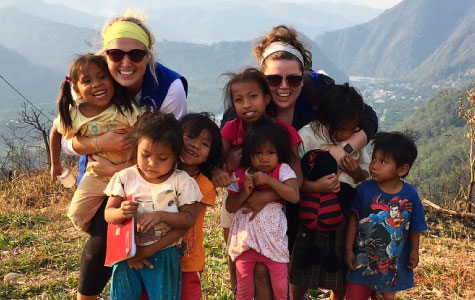 For more than a year, several School of Pharmacy faculty members in Abilene have sought to become more involved in interprofessional medical trips organized
by the TTUHSC Office of Global Health.
For more than a year, several School of Pharmacy faculty members in Abilene have sought to become more involved in interprofessional medical trips organized
by the TTUHSC Office of Global Health.
In August 2017, Chephra McKee, Pharm.D., an assistant professor for the Department of Pharmacy Practice and the school’s Office of Global Health representative, traveled to Nicaragua with faculty from the TTUHSC Schools of Nursing, Medicine, Health Professions and the Masters of Public Health program on a trip centered around children’s health. Earlier this year, in February, Abilene Regional Dean Sara Brouse, Pharm.D., accompanied the same group back to Nicaragua for a medical trip that focused upon women’s health.
During the first two weeks of September, McKee and fourth-year pharmacy student (P4) Nicole Buzzard traveled to Peru for a 17-day medical excursion set up by the Office of Global Health in partnership with the Foundation for International Medical Relief for Children (FIMRC). The trip made Buzzard the pharmacy student to take such a mission trip as part of the school’s new global health elective rotation.
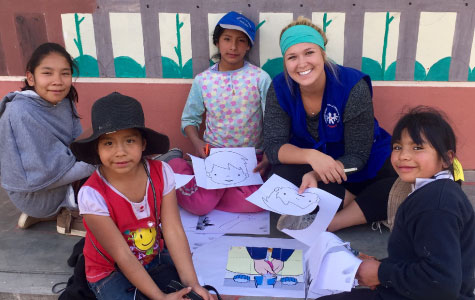 “We partner with our FIMRC student organization chapter for spring break trips, and
a good number of students have participated in those trips,” Brouse said. “However,
the traditional FIMRC trips aren’t true medical mission trips—they are more service-oriented.
We are happy to finally be offering a global health elective rotation to our P4 students
and we hope to expand this opportunity to include summer medical trips for our P1,
P2 students and P3 students.”
“We partner with our FIMRC student organization chapter for spring break trips, and
a good number of students have participated in those trips,” Brouse said. “However,
the traditional FIMRC trips aren’t true medical mission trips—they are more service-oriented.
We are happy to finally be offering a global health elective rotation to our P4 students
and we hope to expand this opportunity to include summer medical trips for our P1,
P2 students and P3 students.”
During her first week in Peru, Buzzard worked in Huancayo, a large city located in the Andes Mountains. McKee joined her for the second week in La Merced, a smaller city situated in the Amazon jungle. Though both cities are located in Peru’s Junín region, McKee said they are very different from each other and provided Buzzard with multiple experiences in a single trip.
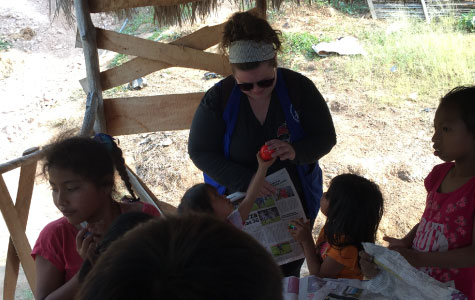 “Visiting both areas was the greatest way to maximize the learning experience for
Nicole,” McKee said. “During the trip, we worked with the FIMRC staff in various hospitals,
clinics and health posts to provide medical care and education to the underserved
populations in the villages and cities we traveled to.”
“Visiting both areas was the greatest way to maximize the learning experience for
Nicole,” McKee said. “During the trip, we worked with the FIMRC staff in various hospitals,
clinics and health posts to provide medical care and education to the underserved
populations in the villages and cities we traveled to.”
Buzzard’s interest in global health began during her second year of pharmacy school, and she and McKee became partners in trying to establish a global health elective for Buzzard’s fourth year. Their goal for the rotation was to teach students about the roles a pharmacist can play within the global health arena, and the Peru trip provided Buzzard a good first experience.
“I learned about the health care system in a country very different than ours,” Buzzard said. “I also learned more about health concerns and common disease states around the world that we may not see here in the United States.”
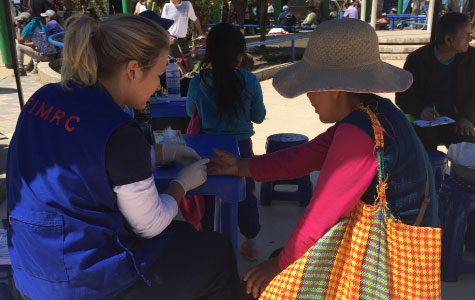 McKee believes it’s important for health care students to about global health issues
and she hopes global pharmacy education will become more accessible to her students.
Each medical-related trip teaches her something and reminds her that focusing upon
and interacting with the patient is more important than the “hurry up” health care
she often sees in the U.S.
McKee believes it’s important for health care students to about global health issues
and she hopes global pharmacy education will become more accessible to her students.
Each medical-related trip teaches her something and reminds her that focusing upon
and interacting with the patient is more important than the “hurry up” health care
she often sees in the U.S.
“Pharmacists have an increasing role here on a local level, but it’s important for our students to learn about more involvement on a global level as well,” McKee said. “Health care professionals can get very focused on just the health care in America and forget about all the resources we have here that aren’t available to patients in resource-poor countries. I think it’s helpful as a student to be able to learn from health care workers in other countries about how resources are managed and to have their eyes opened to how much we actually have here in the U.S.”
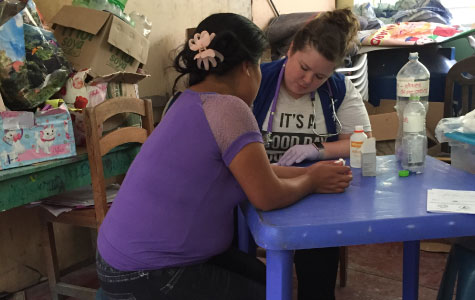 After returning from her first international medical trip, Buzzard feels more aware
of the health care challenges that exist in other parts of the world. Seeing firsthand
how the health care system works in Peru also helped her pick up on some areas that
could be improved upon in the U.S., like shifting the focus away from schedules and
placing it more upon the person. She is convinced that immersing herself in an unfamiliar
culture, even for just a few weeks, has made her a better pharmacy student, a better
medical professional and a better person.
After returning from her first international medical trip, Buzzard feels more aware
of the health care challenges that exist in other parts of the world. Seeing firsthand
how the health care system works in Peru also helped her pick up on some areas that
could be improved upon in the U.S., like shifting the focus away from schedules and
placing it more upon the person. She is convinced that immersing herself in an unfamiliar
culture, even for just a few weeks, has made her a better pharmacy student, a better
medical professional and a better person.
“The clinical activities helped me to solidify my knowledge, learn about disease states
that we rarely see in the United States and grow in my communication skills as I was
able to surpass the barrier of language and culture,” Buzzard explained. “The educational
experiences touched my heart as their passion and desire to learn was incredible to
see. In Peru, providers let relationships and conversations guide where they put their
time, and I think this is something I will take into my professional future. I will
make sure each person and patient I come into contact with feels heard and has my
full attention, because that is what they deserve.” ![]()
Related Stories
Celebrating Veterans: TTUHSC’s General Martin Clay’s Legacy of Service and Leadership
From his initial enlistment in the Army National Guard 36 years ago to his leadership in military and civilian health care management roles, Major General Martin Clay’s career has been shaped by adaptability, mission focus and service to others.
Texas Tech University Health Sciences Center School of Nursing Named Best Accelerated Bachelor of Science in Nursing Program in Texas
The TTUHSC School of Nursing Accelerated Bachelor of Science in Nursing (BSN) program has been ranked the No. 1 accelerated nursing program in Texas by RegisteredNursing.org.
TTUHSC Names New Regional Dean for the School of Nursing
Louise Rice, DNP, RN, has been named regional dean of the TTUHSC School of Nursing on the Amarillo campus.
Recent Stories
The John Wayne Cancer Foundation Surgical Oncology Fellowship Program at Texas Tech University Health Sciences Center Announced
TTUHSC is collaborating with the John Wayne Cancer Foundation and has established the Big Cure Endowment, which supports the university’s efforts to reduce cancer incidence and increase survivability of people in rural and underserved areas.
TTUHSC Receives $1 Million Gift from Amarillo National Bank to Expand and Enhance Pediatric Care in the Panhandle
TTUHSC School of Medicine leaders accepted a $1 million philanthropic gift from Amarillo National Bank on Tuesday (Feb. 10), marking a transformational investment in pediatric care for the Texas Panhandle.
Texas Tech University Health Sciences Center Permian Basin Announces Pediatric Residency Program Gift
TTUHSC Permian Basin, along with the Permian Strategic Partnership and the Scharbauer Foundation, Feb. 5 announced a gift that will fund a new pediatric residency.
